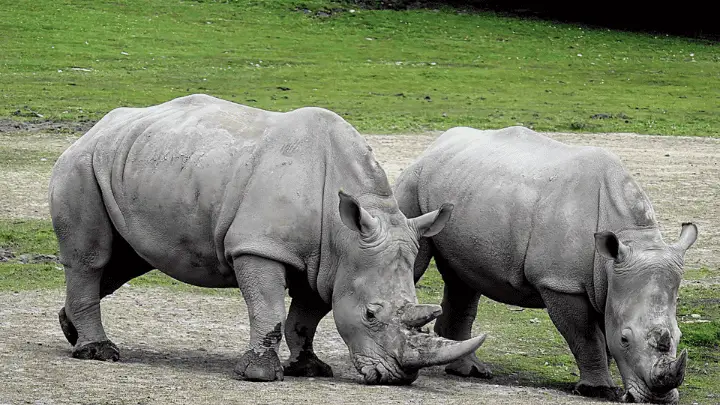Rhinos are one of the most fascinating animals on the planet. But when it comes to their temperament, there’s a lot of misinformation floating around. Are rhinos aggressive and dangerous, or are they friendly giants that want to be left alone?
Rhinos have long been portrayed as aggressive and dangerous due to their intimidating size. This is due to the perception perpetuated by movies and popular media. In this article, you will explore the fascinating world of rhinos and explore their behavior.
You will look closer at their species and the factors that can influence their temperament. By understanding the factors contributing to rhinos’ behavior, you can better appreciate these incredible creatures and dispel misconceptions.
So, join me as I explore the question: are rhinos aggressive or friendly? Discover the surprising truth about these magnificent creatures and gain a newfound understanding of their place in the natural world.
Understanding the Rhino Species
Before delving into their temperament, it’s important to understand the different species of rhinos. There are five main species: the White Rhino, Black Rhino, Indian Rhino, Javan Rhino, and Sumatran Rhino.
Each species has unique characteristics and behaviors, which may influence their level of aggression or friendliness.
1. The White Rhino

The White Rhino is the largest rhino species, known for its gentle nature and herbivorous diet. Contrary to what the name suggests, it is gray. These majestic creatures are primarily found in Africa and are known for their peaceful demeanor.
They often display a calm and non-threatening attitude toward other animals, making them generally friendly. It is easy to tell the difference between a black and a white rhino by looking at their lips. Black rhinos have hooked upper lips, while white rhinos have square lips.
2. The Black Rhino

Unlike its white counterpart, the Black Rhino is more solitary and can exhibit territorial behavior. They are known for being aggressive when provoked or defending their territory.
However, it’s important to note that their aggressive tendencies are mostly defensive and not directed toward humans unless they feel threatened.
3. The Indian Rhino

The Indian Rhino, also known as the Greater One-Horned Rhino, is native to the Indian and Nepal regions. They are small and have one horn on their nose. These rhinos are generally calm and non-aggressive.
They prefer a peaceful existence and are more inclined towards friendly interactions. Their herbivorous diet and docile behavior contribute to their friendly reputation.
4. The Javan Rhino

The Javan Rhino is one of the most critically endangered rhino species, with only a few individuals remaining in the wild.
Due to their limited population, it is challenging to study their behavior extensively. However, based on available information, Javan Rhinos are typically non-aggressive and prefer to avoid confrontation.
5. The Sumatran Rhino

The Sumatran Rhino is another critically endangered species primarily found in Southeast Asia. They are known for their shy and reclusive nature.
While they may display signs of aggression if provoked, they generally avoid conflict and prefer a peaceful existence. They are the smallest living rhino species.
Factors Influencing Rhino Behavior
To fully understand whether rhinos are aggressive or friendly, it is important to consider the various factors influencing their behavior. These factors include their instincts, habitat, social structure, and past experiences.
1. Instincts
Instincts play a significant role in determining a rhino’s behavior, whether it is aggressive or friendly. Rhinos are inherently territorial animals with a strong instinct to protect their territory and offspring.
This instinct can sometimes manifest as aggression towards perceived threats, including humans. For example, the territorial nature of some rhino species is driven by the need to protect their preferred grazing areas or mating grounds.
2. Habitat and social structure
The environment in which rhinos live plays a significant role in their behavior. Rhinos that inhabit open grasslands with abundant resources may be more relaxed and less likely to exhibit aggressive behavior.
Additionally, rhinos have a hierarchical social structure, with dominant individuals asserting their authority over subordinate ones. This hierarchy can also influence their behavior, as dominant rhinos may display more aggression toward others.
However, it is important to note that not all rhinos exhibit aggressive behavior, as individual temperament and past experiences also contribute to their overall behavior.
3. Past experiences
Past experiences play a significant role in determining a rhino’s behavior. Rhinos may display aggressive behavior as a defensive mechanism if they have had negative encounters with humans, such as being poached or harassed.
When a rhino has had positive experiences with humans, such as being rescued or treated with kindness, it may display friendly behavior. These past experiences shape the rhino’s perception of humans and can greatly influence how they interact with us.
4. Sex
Sex also significantly determines a rhino’s behavior, particularly its aggression levels. Male rhinos are more likely to exhibit aggressive behavior than their female counterparts. This is due to the presence of testosterone in males, which makes them territorial and dominant.
5. Mating period
The mating period is another important determinant of a rhino’s behavior. During this time, male rhinos become highly territorial and aggressive towards other males to defend their mating rights.
They may also become more aggressive towards females if they feel threatened or challenged by other males. Female rhinos, on the other hand, tend to become more tolerant and receptive toward males during the mating period.
However, it’s important to note that every rhino is unique and may react differently based on various factors such as age, experience, and personality.
FAQs
Can rhinos be domesticated?
Rhinos are wild animals and are not suitable for domestication. They have specialized needs and require vast habitats to thrive.
Are rhinos intelligent?
Rhinos possess intelligence that allows them to adapt to their environment and navigate various challenges. However, their intelligence is not comparable to highly social animals like dolphins or primates.
Do rhinos attack vehicles?
Rhinos have been known to charge at vehicles that enter their territory, especially if they feel threatened or provoked. Respecting their space and observing them from a safe distance is crucial.
What should you do if you encounter a rhino?
If you encounter a rhino in the wild, it is essential to remain calm and avoid sudden movements. Slowly back away from the rhino while maintaining a safe distance. Do not run or make loud noises that may startle the animal.
How can we help protect rhinos?
To protect rhinos, we can support conservation organizations, spread awareness about their plight, and contribute to initiatives to preserve their natural habitats.
Additionally, avoiding purchasing products made from rhino horns can help reduce the demand for illegal poaching.
Final Verdict: Are Rhinos Aggressive or Friendly?
While rhinos are often depicted as aggressive animals, the truth is that they typically only attack when they feel threatened or are defending their young. In most cases, rhinos will ignore humans and other animals in their vicinity and go about their business.
That said, it’s still important to exercise caution when close to these powerful creatures. Avoid sudden movements or loud noises; always give them ample space to roam. If you encounter a rhino up close, stay calm and slowly back away to a safe distance.
Whether rhinos are aggressive or friendly largely depends on their personality and circumstances. While some may be more prone to aggressive behavior than others, most rhinos want to live their lives in peace and solitude.
In general, rhinos are not aggressive animals, but they will defend themselves if they feel threatened. It is important to give rhinos plenty of space and to avoid approaching them if possible.
You can also explore the list of some endangered animals.
Thanks for reading.

